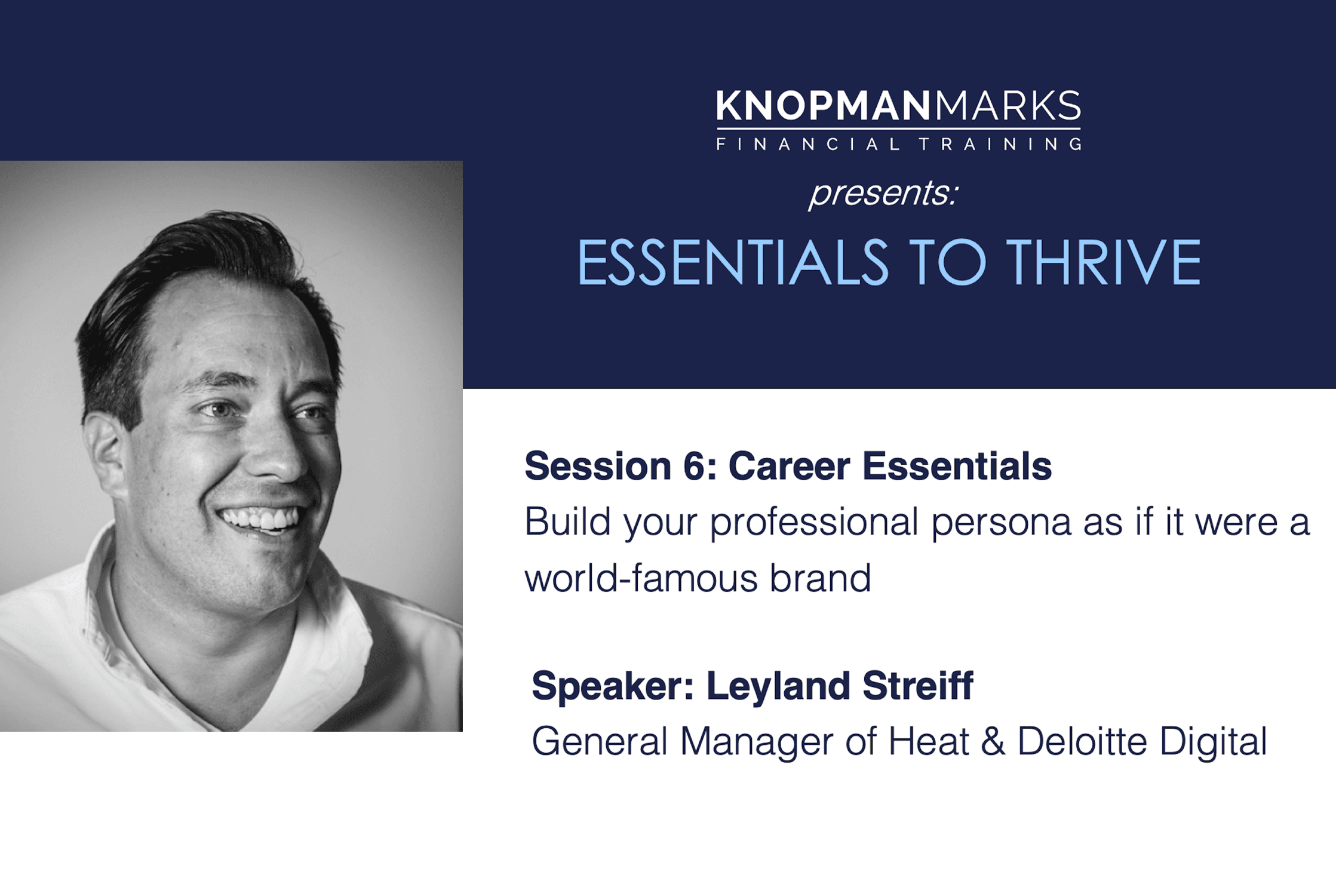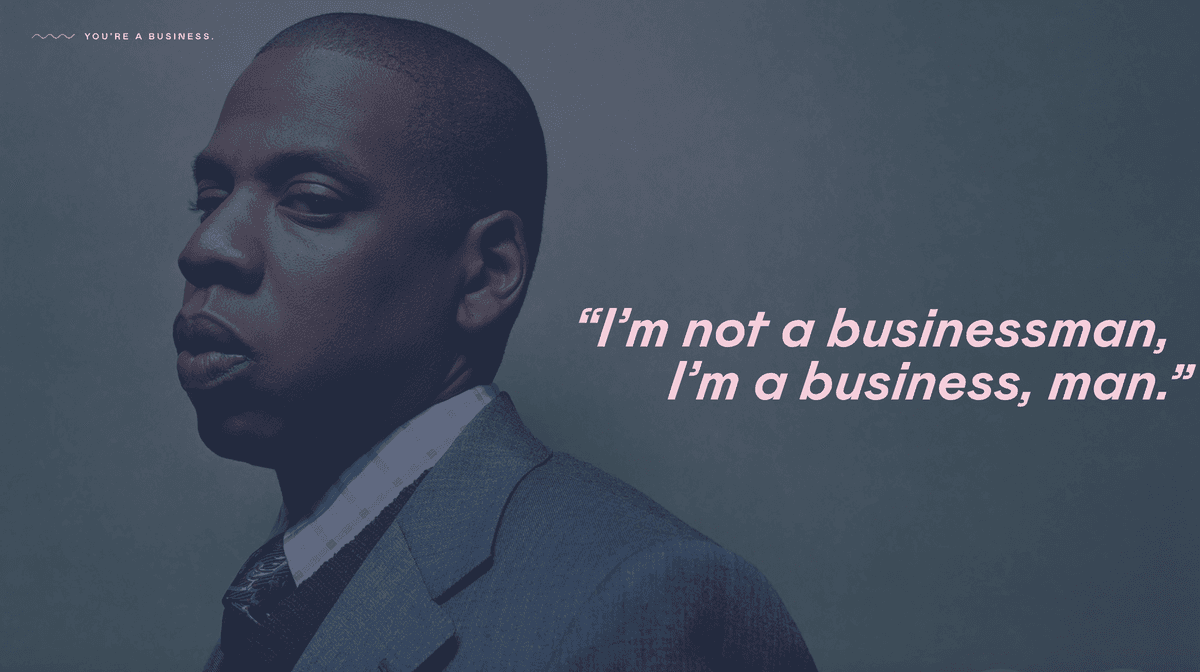How to Build Your Personal Brand at Work
Filed in: Essentials to Thrive, Knopman News

When people meet you for the first time, what impression do you make? Do they think you’re confident? Scattered? Is it a mixed bag depending on whom you ask?
Building your personal brand can help you project a clear image of your strengths so you leave people with a strong sense of your value, says Leyland Streiff, whose prestigious career in brand-building includes working at Ogilvy and DDB, and on campaigns for American Express, Tiffany & Co., and BlackRock.
In his engaging and informative Essentials to Thrive masterclass, Career Essentials – Build your professional persona as if it were a world-famous brand, Streiff explores the steps that will help you identify and build your brand. This will help you stand out from your peers to make a distinct impression and advance in your career.
“A brand is just as much what someone knows about you, as what someone feels about you,” says Streiff, general manager of Heat & Deloitte Digital. Every professional interaction either reinforces or dilutes the personal brand you’re trying to create.

3 Big Ideas to Build Your Personal Brand
Act like a brand. Help people understand what you stand for, says Streiff. Consider whether everything you do reflects your brand identity, including how you dress and present yourself, and your tone of voice with clients, peers, and direct reports. “You want to be consistent in how you present your brand,” notes Streiff, who admits to rereading emails numerous times and opening and testing attachments before sending his emails. Because every touchpoint with clients and colleagues matters. Have a rigorous checks-and-balances system so that you appear polished and professional in all your interactions.
Your personal brand is the business of you. Take a card from Jay-Z’s deck. “Treating yourself like a brand can accelerate your professional aspirations,” says Streiff. This starts by reframing your professional perspective. You’re more than an employee; you’re building the business of you. If you build your personal brand well, you can generate a premium in the marketplace, be able to more easily evolve your career in new directions, and have a loyal base of supporters.
Successful brands connect to our emotions. Streiff notes that 80% of the decisions we make each day are based on emotion. Your personal brand should stand for something. Otherwise, people will not know what emotional space you occupy in their minds, and that they can relate to you, Streiff says. That means you need to think about how you add value to the world. You can demonstrate your value through projects, accomplishments, skills, and how you treat others.
Q&A with Leyland Streiff
What drew you to advertising?
My dad was a photographer and I liked being around art. I took a lot of photographs as a kid. In college, I minored in ceramics and majored in English literature. I wrote very briefly but I didn’t like making art and writing in isolation. In advertising, writing and art are part of the whole puzzle. At its best, advertising is art that is able to elicit emotions so powerfully it can change commercial behavior. Advertising can create emotional resonance deeply.
Have you ever been unsure of what your personal brand was?
Absolutely. When I was laid off. In advertising, it’s a rite of passage. A company loses an account and you’re laid off. I was laid off early in my career and it really messed with my head. I had worked hard. I thought I was really good at what I did. I thought I was invaluable. That experience turned out to be a pivotal point in my career. It reminded me to put myself in the driver’s seat of my career. When I was laid off, I looked at the fragmentation in the advertising industry. I had specialized in digital advertising. I decided I wanted to set myself apart by offering integrated marketing—digital as well as traditional advertising, so I learned both sides. That was the foundation of what made me distinct. It’s what led to a job at Ogilvy and helped me rise through the ranks.
How would you describe your personal brand today?
My brand is adaptability, being a fixer, and caring about people as much as I care about the work. I made the move to Deloitte when I wanted to try to put together a new type of agency built for modern marketers who are forward-looking. There was confidence that I could do this because I was known for my ability to adapt. When I started working at BlackRock, I didn’t know what an ETF was but I learned. I was also known for coming in and solving problems for clients. I would figure out problems and help companies flourish. Because of my personal brand, I was able to help create a type of agency that hadn’t been done before, where I was able to do things I had never done before.
Tune In Every Week
REGISTER HERE to attend our live-streaming, Essentials to Thrive masterclass sessions every Wednesday at 12:30 pm EST. Coming up:
- May 20 – Success Essentials: Let go of the myth of work-life balance; create an integrated and fulfilling life. Speaker: Bernadette McBurnie, Success Coach, Founder of Women’s Academy
- May 27 – Happiness Essentials: Dive into the practices and techniques proven to increase your bliss. Speaker: Dave Meshkov, Managing Director, Head of Course Design at Knopman Marks Financial Training
If you missed Leyland Streiff’s masterclass, a recording is available in the Training Center at www.knopman.com. You can also access the recording and materials from previous sessions:
Written by Suzanne Riss
Suzanne Riss is an author and Director of Communications at Knopman Marks Financial Training. Previously the award-winning Editor-in-Chief of Working Mother magazine, she is a fierce advocate for issues facing working moms and an authority on work/life trends. Her expertise has been tapped in interviews by The New York Times, The Wall Street Journal, Good Morning America, the Today Show, and CNN. Suzanne's third book, Work Disrupted, published by Wiley, was released in January 2021.
Related posts
- Read more
Introducing How to Finance: A Beginner’s Guide to the Industry
One of our primary roles as educators is to bridge gaps in knowledge. Our newest course, How to F
- Read more
How Intentional Rest Boosts Performance
Though you may think that studying all afternoon without a break will improve your performance, r
- Read more
Research Analyst Exams Update – Changes to S86/87
In late February, FINRA filed with the SEC revisions to the content outline and selection specifi


